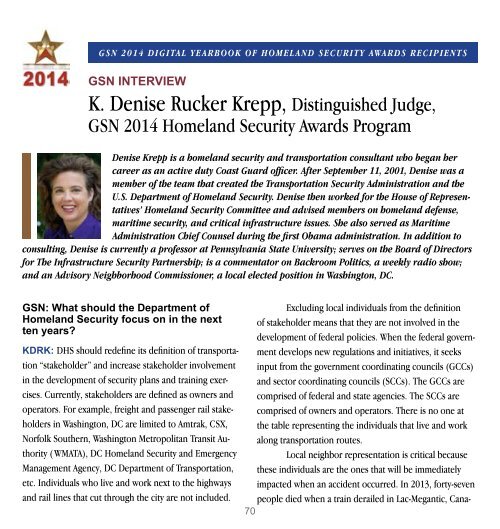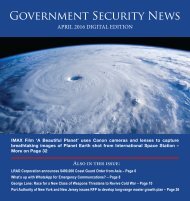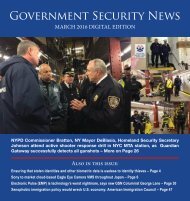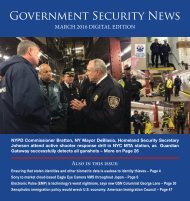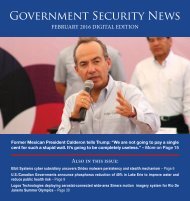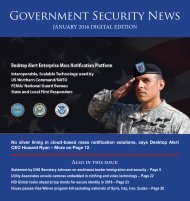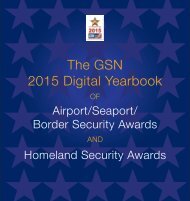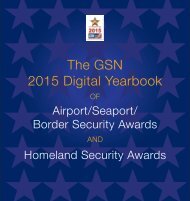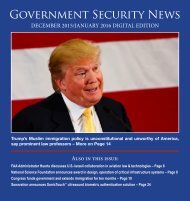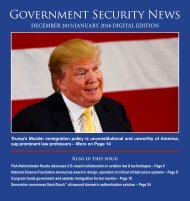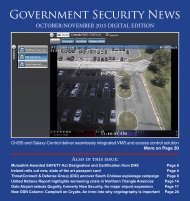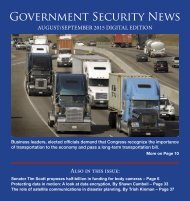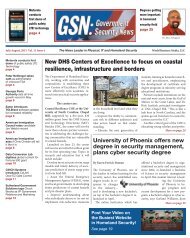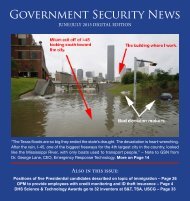2014 Digital Yearbook of Homeland Security Awards
You also want an ePaper? Increase the reach of your titles
YUMPU automatically turns print PDFs into web optimized ePapers that Google loves.
GSN <strong>2014</strong> <strong>Digital</strong> <strong>Yearbook</strong> <strong>of</strong> <strong>Homeland</strong> <strong>Security</strong> <strong>Awards</strong> Recipients<br />
GSN INTERVIEW<br />
K. Denise Rucker Krepp, Distinguished Judge,<br />
GSN <strong>2014</strong> <strong>Homeland</strong> <strong>Security</strong> <strong>Awards</strong> Program<br />
Denise Krepp is a homeland security and transportation consultant who began her<br />
career as an active duty Coast Guard <strong>of</strong>ficer. After September 11, 2001, Denise was a<br />
member <strong>of</strong> the team that created the Transportation <strong>Security</strong> Administration and the<br />
U.S. Department <strong>of</strong> <strong>Homeland</strong> <strong>Security</strong>. Denise then worked for the House <strong>of</strong> Representatives’<br />
<strong>Homeland</strong> <strong>Security</strong> Committee and advised members on homeland defense,<br />
maritime security, and critical infrastructure issues. She also served as Maritime<br />
Administration Chief Counsel during the first Obama administration. In addition to<br />
consulting, Denise is currently a pr<strong>of</strong>essor at Pennsylvania State University; serves on the Board <strong>of</strong> Directors<br />
for The Infrastructure <strong>Security</strong> Partnership; is a commentator on Backroom Politics, a weekly radio show;<br />
and an Advisory Neighborhood Commissioner, a local elected position in Washington, DC.<br />
GSN: What should the Department <strong>of</strong><br />
<strong>Homeland</strong> <strong>Security</strong> focus on in the next<br />
ten years?<br />
KDRK: DHS should redefine its definition <strong>of</strong> transportation<br />
“stakeholder” and increase stakeholder involvement<br />
in the development <strong>of</strong> security plans and training exercises.<br />
Currently, stakeholders are defined as owners and<br />
operators. For example, freight and passenger rail stakeholders<br />
in Washington, DC are limited to Amtrak, CSX,<br />
Norfolk Southern, Washington Metropolitan Transit Authority<br />
(WMATA), DC <strong>Homeland</strong> <strong>Security</strong> and Emergency<br />
Management Agency, DC Department <strong>of</strong> Transportation,<br />
etc. Individuals who live and work next to the highways<br />
and rail lines that cut through the city are not included.<br />
Excluding local individuals from the definition<br />
<strong>of</strong> stakeholder means that they are not involved in the<br />
development <strong>of</strong> federal policies. When the federal government<br />
develops new regulations and initiatives, it seeks<br />
input from the government coordinating councils (GCCs)<br />
and sector coordinating councils (SCCs). The GCCs are<br />
comprised <strong>of</strong> federal and state agencies. The SCCs are<br />
comprised <strong>of</strong> owners and operators. There is no one at<br />
the table representing the individuals that live and work<br />
along transportation routes.<br />
Local neighbor representation is critical because<br />
these individuals are the ones that will be immediately<br />
impacted when an accident occurred. In 2013, forty-seven<br />
people died when a train derailed in Lac-Megantic, Cana-<br />
70


